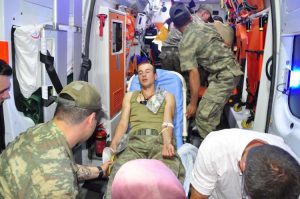Army Times reports that what began as a line of defense against biological warfare has been unleashed on unsuspecting victims in an Army laboratory — 150 mashed potatoes, to be exact.
 The result could speed up the Army’s food-testing process, and even help save lives in the event of an outbreak caused by a foodborne pathogen. Which brings us back to the potatoes: 75 of them were infected with Salmonella for a recent test, and researchers at the Army’s Edgewood Chemical Biological Center found all of them using a Mass Spectrometry Proteomics Method.
The result could speed up the Army’s food-testing process, and even help save lives in the event of an outbreak caused by a foodborne pathogen. Which brings us back to the potatoes: 75 of them were infected with Salmonella for a recent test, and researchers at the Army’s Edgewood Chemical Biological Center found all of them using a Mass Spectrometry Proteomics Method.
Tests that try to grow cultures of suspected pathogens to determine their presence take at least three days, said Mary Wade, head of ECBC’s Point Detection Branch — sometimes up to a month. Spectrometry takes four hours, at most. The test itself, after the questionable foodstuff is prepped for examination, takes minutes.
And unlike other methods that focus on a particular suspected toxin, this one can target any invader that’s been “genomically sequenced,” Wade said, including thousands of types of bacteria and viruses, even fungi and parasites.
The project began as a way to gauge environmental samples — air, water, even blood — for exposure to bacteria, Wade said. That was before the Army’s Public Health Command expressed interest.
“We were not, at the time, necessarily doing food work,” Wade said. “Some stuff with lettuce.”
Initial tests on spuds, a favored subject because of its consistency, showed promise four or five years ago, she said. That eventually led to the larger-scale potato testing, and the recent test led to further program expansion, according to a June 9 ECBC release, including sending the MSPM equipment to Camp Zama, Japan.
Statistics for foodborne illnesses are kept at the Defense Department level, a spokeswoman for PHC said: According to DoD figures, more than 2,700 service members came down with salmonellosis from 2002-2012, and more than 12,300 suffered from “other bacterial food poisoning.”
Tracking such illnesses isn’t an exact science — many service members likely wouldn’t report mild symptoms of food poisoning, and those who do report stomach or intestinal problems are grouped in categories that may or may not involve foodborne pathogens. More than 61,000 troops had “ill-defined intestinal infections” from 2002-12, DoD data show, and almost 380,000 reported suffering from diarrhea.
 In a statement, the Swiss defence department said that on Thursday afternoon, 43 recruits and members of the Jassbach academy in Linden, in Bern Canton, suddenly suffered from acute gastrointestinal problems, with diarrhoea and vomiting.
In a statement, the Swiss defence department said that on Thursday afternoon, 43 recruits and members of the Jassbach academy in Linden, in Bern Canton, suddenly suffered from acute gastrointestinal problems, with diarrhoea and vomiting.








